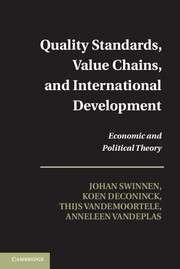Book contents
- Frontmatter
- Contents
- Preface and Acknowledgments
- 1 Introduction
- 2 Modeling Standards
- 3 Efficiency and Equity Effects of Standards
- 4 The Political Economy of Standards and Development
- 5 International Trade and Standards
- 6 Risk, Externalities, and the Nature of Standards
- 7 Endogenous Private and Public Standards in Value Chains
- 8 Butterflies and Political Economy Dynamics in Standard Setting
- 9 The Political Economy of Standards and Inclusion in Value Chains
- 10 Standards, Production Structure, and Inclusion in Value Chains
- 11 Standards, Market Imperfections, and Vertical Coordination in Value Chains
- 12 Market Power and Vertical Coordination in Value Chains
- 13 Price Transmission in Value Chains
- 14 Commodity Characteristics and Value Chain Governance
- 15 Economic Liberalization, Value Chains, and Development
- 16 Standards and Value Chains with Contracting Costs: Toward a General Model
- 17 General Equilibrium Effects of Standards in Value Chains
- References
- Index
2 - Modeling Standards
Published online by Cambridge University Press: 05 August 2015
- Frontmatter
- Contents
- Preface and Acknowledgments
- 1 Introduction
- 2 Modeling Standards
- 3 Efficiency and Equity Effects of Standards
- 4 The Political Economy of Standards and Development
- 5 International Trade and Standards
- 6 Risk, Externalities, and the Nature of Standards
- 7 Endogenous Private and Public Standards in Value Chains
- 8 Butterflies and Political Economy Dynamics in Standard Setting
- 9 The Political Economy of Standards and Inclusion in Value Chains
- 10 Standards, Production Structure, and Inclusion in Value Chains
- 11 Standards, Market Imperfections, and Vertical Coordination in Value Chains
- 12 Market Power and Vertical Coordination in Value Chains
- 13 Price Transmission in Value Chains
- 14 Commodity Characteristics and Value Chain Governance
- 15 Economic Liberalization, Value Chains, and Development
- 16 Standards and Value Chains with Contracting Costs: Toward a General Model
- 17 General Equilibrium Effects of Standards in Value Chains
- References
- Index
Summary
Introduction
A key issue is how to model standards. An extensive theoretical literature addresses the economics of regulation and standards. Standards typically have an impact on both efficiency and equity – a key issue in this book. Hence different groups in society may be affected differently and will therefore have different preferences. This has engendered a substantial literature on how standards are suboptimal instruments that transfer income from one group to another. Initially, the main focus of this literature was on competition and welfare effects of minimum quality standards. Examples are Bockstael (1984), Crampes and Hollander (1995), Leland (1979), Ronnen (1991), Valletti (2000), and Winfree and McCluskey (2005). Other types of standards such as labeling (e.g., Fulton and Giannakas, 2004; Roe and Sheldon, 2007) or environmental standards (e.g., Schleich, 1999) have been analyzed more recently.
Standards may solve market failures related to production and consumption externalities (Roberts et al., 1999; Schleich, 1999; van Tongeren et al., 2009). Externalities arise when one economic agent's actions have direct effects on other economic agents, which are not accounted for in the market's price system. For example, an upstream firm's river pollution imposes a negative externality on downstream firms using the river water as input, which may therefore need to install a costly purification plant without compensation by the upstream firm. This type of externality could be reduced by, for example, imposing a minimum abatement standard on the upstream firm.
Standards may also address market failures due to network externalities. In industrial sectors such as telecommunication and consumer electronics, compatibility between different products and firms is an important issue. Compatibility standards that improve the interoperability between various products and firms may have considerable effects on competition and welfare (see, e.g., Farrell and Saloner, 1985; Jeanneret and Verdier, 1996; Katz and Shapiro, 1985).
Probably the most important motivation for the use of safety and quality standards is the existence of information asymmetries. In general, product characteristics can be divided into three categories: search, experience, and credence characteristics (Darby and Karni, 1973; Nelson, 1970). Search attributes can be ascertained in the search process prior to purchase (e.g., the color of an apple), whereas experience characteristics can be discovered only after purchasing and using the product (e.g., the apple's taste), and credence qualities cannot be evaluated in normal use (e.g., the amount of pesticide residue on the apple).
- Type
- Chapter
- Information
- Quality Standards, Value Chains, and International DevelopmentEconomic and Political Theory, pp. 11 - 18Publisher: Cambridge University PressPrint publication year: 2015



